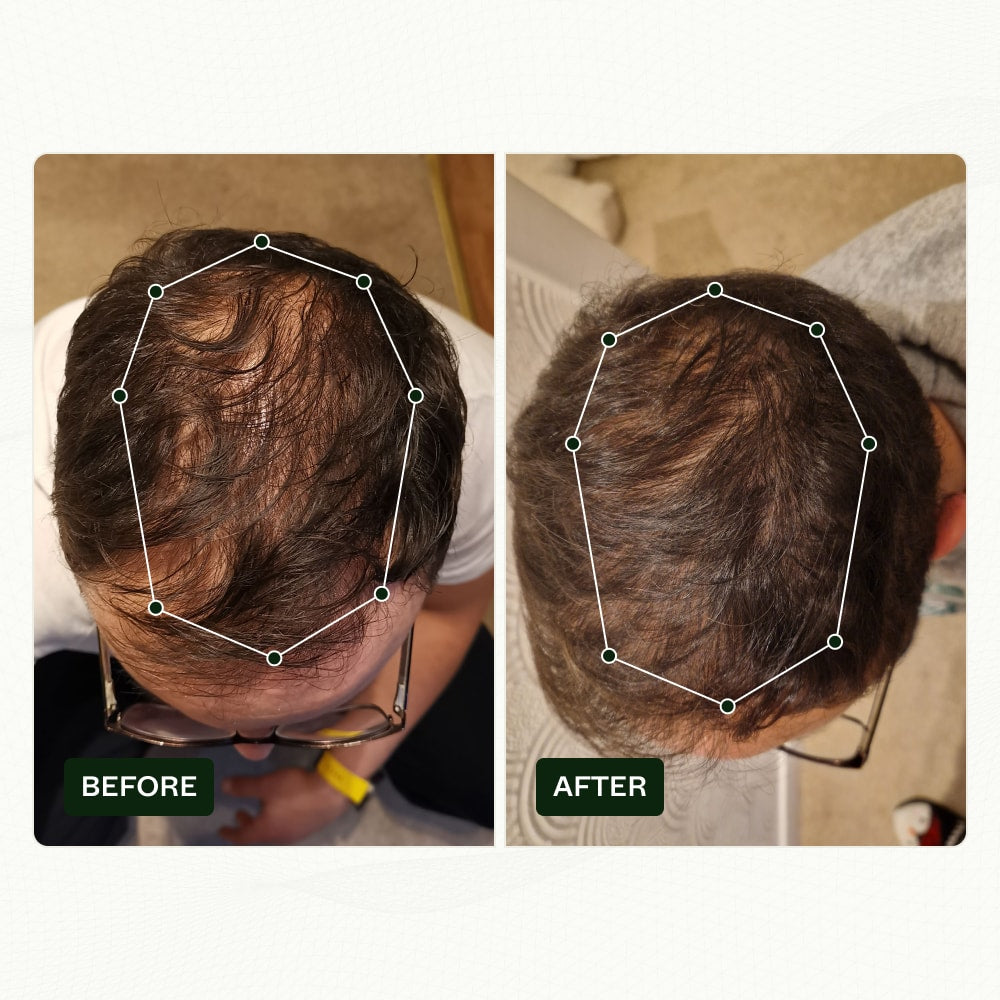What is rosemary oil?

Rosemary oil is an essential oil extracted from the leaf extract of the Rosemary plant, in the Mediterranean region- scientifically known as Rosmarinus officinalis. It's renowned for its aromatic, culinary, and medicinal uses, including its potential benefits for hair health.
The use of rosemary oil for hair health is not a new phenomenon. This aromatic herb was used in traditional medicine long before it found its way into today's hair products.
Rich in antioxidants and anti-inflammatory compounds, rosemary oil is believed to stimulate blood circulation to the scalp, promoting healthier and potentially thicker hair growth.
How does rosemary oil increase hair growth?
Rosemary oil for hair loss is believed to enhance hair growth through its ability to improve blood circulation. By applying it to the scalp, or mixing it with shampoo, it can stimulate the hair follicles by increasing blood flow, which can potentially lead to increased hair growth.
Additionally, rosemary oil might also inhibit the action of the enzyme 5-alpha reductase, which converts testosterone to dihydrotestosterone (DHT), a hormone shown to cause hair loss. By potentially blocking this process, rosemary oil could help to slow or prevent hair loss and thinning.
Clinical studies and results
Indeed, several scientific studies have suggested that rosemary oil could be an effective treatment for androgenic alopecia, also known as male or female pattern baldness. A prominent 2015 randomized comparative trial demonstrated that rosemary oil performed on par with minoxidil (Rogaine), a popular pharmaceutical treatment for this type of hair loss.
Notably, those using rosemary oil reported fewer side effects than the minoxidil group, such as itchy scalp, a common complaint among minoxidil users.
Male pattern baldness is largely driven by dihydrotestosterone (DHT), a derivative of the hormone testosterone. DHT binds to receptors in hair follicles, leading to hair thinning and eventual loss.
As men typically have higher testosterone levels than women, they often experience hair loss more frequently, more severely, and at a younger age.
Intriguingly, a 2013 study on mice found that rosemary oil could potentially counter this process.
Mice with testosterone-related hair loss exhibited hair regrowth when treated with rosemary oil, leading researchers to speculate that the oil might prevent DHT from binding to hormone receptors in the hair follicles, thus averting hair loss.
What are the side effects of using rosemary oil?
Here are the major side effects and risks associated with using rosemary oil:
- Rosemary oil may not be safe during pregnancy or breastfeeding (chestfeeding). Some labels on 100% rosemary products warn against use as it could potentially affect the fetus or lead to a miscarriage.
- Rosemary essential oil can potentially irritate the skin if applied in high concentrations or without a carrier oil. Symptoms can include discomfort, redness, itching, or a burning sensation. To avoid this, it's recommended to dilute the essential oil with a carrier oil like coconut or jojoba oil before applying it to your scalp.
- Allergic reactions are possible, especially for individuals with known sensitivities to the Lamiaceae family of plants, to which rosemary belongs. Symptoms of an allergic reaction may include rashes, breathing difficulties, or swelling.
- Ingesting large amounts of rosemary oil can lead to serious side effects, including vomiting, spasms, or even pulmonary edema.
What is Minoxidil?

Minoxidil is a medication primarily used to stimulate hair growth and slow balding. It is widely known under the brand name Rogaine and is available over-the-counter in various forms, including topical foam and solution.
Originally developed as a treatment for high blood pressure, Minoxidil's hair growth stimulating properties were used to treat hair loss.
Minoxidil is commonly used to treat androgenetic alopecia, also known as male or female pattern hair loss, or thinning hair. It has proven effectiveness in numerous clinical studies for male pattern hair loss.
How does minoxidil increase hair growth?
Minoxidil promotes hair growth by extending the anagen phase, which is the active growth phase of hair follicles. It achieves this by opening potassium channels, which results in increased blood flow and oxygen, nutrients, and hormonal delivery to the hair follicles. This, in turn, stimulates the follicles and encourages them to produce new, healthy hair.
However, the exact mechanism by which Minoxidil stimulates hair growth is not entirely understood.
It's important to note that while Minoxidil can help to stimulate hair growth, it doesn't specifically target the hormonal cause of hair loss, such as DHT.
Clinical studies and results
Two significant studies focusing on the effects of 5% Minoxidil for treating male-pattern hair loss and alopecia areata have shown promising results.
The first study, conducted over a year, involved 984 men with male-pattern hair loss. The participants applied 1 ml of 5% minoxidil solution twice a day to the areas of the scalp affected by hair loss.
Throughout this period, participants collected their lost hair during washing for laboratory counting. By the end of the year, dermatologists observed that hair loss areas had decreased in size for 62% of the patients, demonstrating a significant increase in hair count.
The second study, conducted over 4 months and involving 743 men with male-pattern hair loss, yielded similarly encouraging results.
At the end of the study period, 67.3% of men judged their hair loss areas to be smaller, while 31.9% reported no change, and only 0.8% observed larger areas of hair loss.
Importantly, 7.5% of men found the 5% minoxidil solution very effective in stimulating new hair growth, and 74.2% reported improved hair density.
These studies highlight the efficacy of Minoxidil in not only slowing down hair loss but also promoting new hair growth, emphasizing its potential as a viable treatment for male-pattern hair loss.
What are the side effects of using Minoxidil?
Here are some of the potential side effects of using Minoxidil:
- Application site reactions: The area of skin where minoxidil is applied can experience burning, stinging, or redness.
- Unwanted facial/body hair: In some cases, minoxidil can cause hair growth in unwanted places, including the face and other parts of the body.
- Dizziness or fainting: This can occur if the medication is absorbed into the bloodstream, which is more likely if more than the recommended amount is used.
- Rapid or irregular heartbeat: This is a rare but serious side effect that requires immediate medical attention.
- Immune system reactions: Minoxidil can react with the immune system and cause certain diseases if not regulated.
- Fatigue, tiredness, and nausea: These are less common side effects, but if they persist or worsen, medical help should be sought.
FAQs
How long do rosemary oil and minoxidil take to work?
Both rosemary oil and minoxidil require consistent application over several months before noticeable results are seen. On average, minoxidil usually shows results within 3 to 6 months of regular use.
Rosemary oil's timeline might be similar, but it can vary based on individual responses and the severity of hair loss.
Remember, patience and consistency are key when using these treatments for hair loss.
Can you use rosemary and minoxidil together?
While there's no rule against using rosemary oil and minoxidil together, the effectiveness and safety of this combination haven't been extensively studied.
Using both could potentially enhance the benefits, given their similar mechanisms of promoting hair growth.
However, as with any treatment regimen, it's best to consult a healthcare professional before starting to ensure it's safe and suitable for your specific needs and circumstances.
References
- https://health.clevelandclinic.org/rosemary-oil-for-hair/amp/
- https://www.ncbi.nlm.nih.gov/pmc/articles/PMC6691938/
- https://www.jaad.org/article/S0190-9622(03)03692-2/fulltext
Read more:








